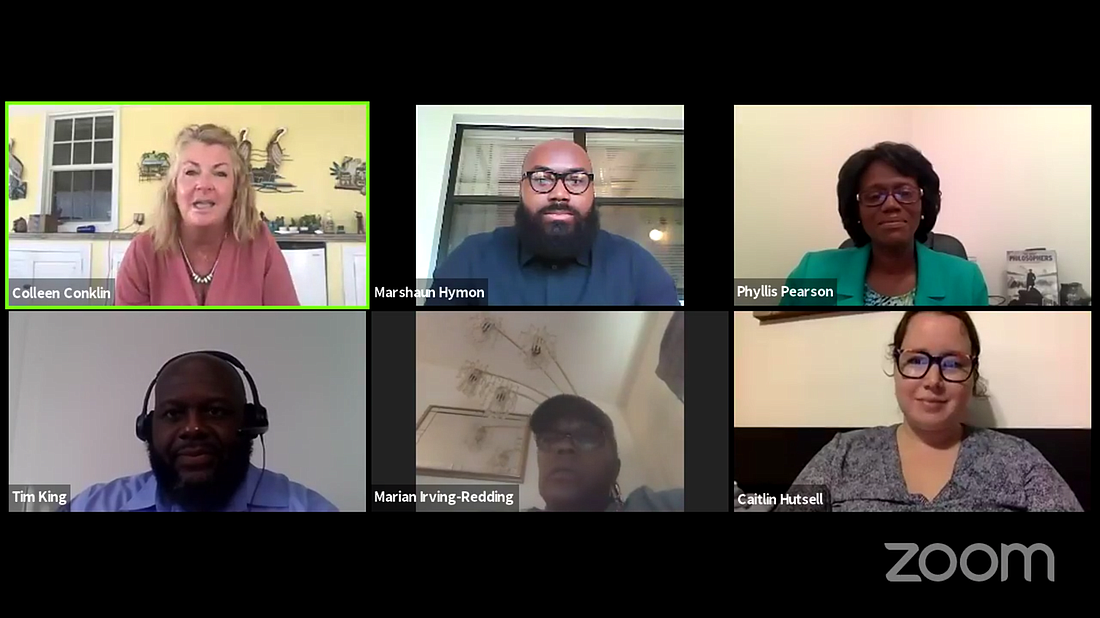- January 15, 2025
-
-
Loading

Loading

by: Brent Woronoff
Contributing Writer
When somebody points out what might be an unconscious bias, one’s natural inclination is to become defensive, Flagler County School Board member Colleen Conklin said Thursday, June 25, during a panel discussion on race relations.
“My natural response right now is to rattle off all the initiatives and projects,” she said. “But that is not helpful. You need to hear it, own it and then try to figure out how you can do better with those situations.”
Conklin is hosting a three-part Zoom webinar entitled “Uncomfortable Conversations: A Time to Lean In.” The first part, “Building a Foundation of Understanding,” was held on June 18.
"White people have to lay your defenses down. Realize it’s not about you but about the harm you’re causing someone else."
CAITLIN HUTSELL, teacher
The second discussion, on June 25, focused on identifying unconscious bias and the roots of institutional racism. The final discussion, scheduled for 6 p.m. July 2, is titled “Creating Solutions Together.”
People can register for the webinar on Conklin’s School Board Facebook page, flaglerschoolnews.conklin. Each discussion is also streamed on Facebook Live.
Conklin is co-moderating the panel discussions with Dr. Tim King, the state program director for SEDNET, the multiagency network for Students with Emotional/Behavioral Disabilities.
Each week the panel changes. On June 25, Conklin and King were joined by Dr. Marshaun Hymon, the regional head of diversity, equity and inclusion for nonprofit Year Up and a Flagler Palm Coast High School graduate; Flagler County Schools’ staffer and veteran educator Dr. Phyllis Pearson; Caitlin Hutsell, a teacher, media specialist and FPC grad; and Marian Irving-Redding, a Flagler County native, grandmother and youth advocate.
The Black panel members spoke about their experiences with unconscious bias, some obvious, others more ambiguous.
Irving-Redding said she was among the first Black students to be integrated into Flagler County schools.
“We were not allowed to wear anything that symbolized Blackness,” she said. “Nehrus, African symbol earrings. We felt like we were in a whole new world.
“(We questioned) why is it fair for (white students) to have rebel flags on the front of their trucks as well as shotguns inside their trucks. One of the guys went to take the flag off, and for the first time during that integration period there was an uprising. It ended up with guns being on the campus, and all of this craziness.”
More recently, Hymon said he got good grades at FPC and received multiple college scholarships as well as a lot of support from the community. But he wondered why other Black students weren’t succeeding.
“I didn’t realize,” he said, “I was being tokenized. … They didn’t support me because of my Blackness; they supported me because I was able to rise in spite of my Blackness.
“To young Black men and Black women listening, don’t fall victim to being tokenized,” he said. “If you’re receiving support, that’s great; bring friends, family along with you. To the educators, think about the one Black or brown student who stands out in your mind and reflect on what you love about that student and how you can influence others in the same way.”
King said unconscious biases can be passed down from generation to generation. As an example he pointed to the common jokes and memes targeting women drivers.
“It starts with young boys listening to men joke about women’s ability to drive or park correctly and dwells in their thought process and then it starts to build,” he said.
“Identifying implicit biases are important,” King said. “Those biases can strip away your identity.”
As for institutional racism that can start in the classroom, Hutsell said she tries to give her students a wide range of reading options that detail people’s entire humanity.
“I don’t want my students to go through 12th grade having only read about Tom Robinson (from “To Kill a Mockingbird”) and Othello, and only know black characters from trauma,” she said.
King said, "Some kind of plan addressing diverse needs of kids, pulling evaluations not rooted in bias, not relying on one score or two scores to make a determination of a kid will benefit all of our kids.”